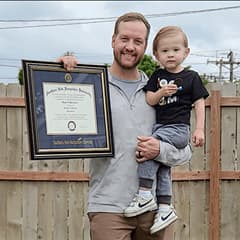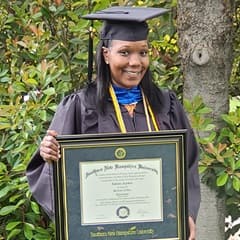Picture an Online Degree at Your Own Pace

It might seem daunting to start on a path toward a new career or reach your personal goals with an online degree — especially if you've never gone this route before. But don't let that uncertainty hold you back.
Online learning doesn't try to replicate a traditional classroom setting, which brings with it the necessity to be in one place at a set time every week. Instead, as a student at an online university, like Southern New Hampshire University (SNHU), you can still uphold your regular schedule while meeting deadlines.
"There’s no expectation to log in at a specific day or time during the week, so all types of schedules and commitments can be accommodated," said Kelly Levine, an academic advisor at SNHU who works with undergraduate computer science, geoscience and environmental science students. "Students are able to work, care for families and live their lives while earning their degree."
How an Online Program Works

If you're wondering how online courses work at SNHU, you may be tasked with a combination of discussion posts, readings, academic papers and other assignments on a weekly basis. Consistently scheduled due dates allow you to complete coursework day or night, in large chunks or piece by piece.
Having time management strategies is key for online students, according to Levine, who has been an advisor since 2019. "I always recommend students log in early in the week to review the assignments and make their plan."
The short terms — 8 weeks for undergraduate programs and 10 weeks for the master's level — allow you to register for courses year-round, doubling up when you can or taking a term off when you need to. And with rolling admissions, classes are always starting soon.
Find Your Program
Here's how six graduates have shown that earning an online degree at your own pace is possible.
Juggling School, Work and Family Responsibilities
Many online students choose the non-traditional path because they have other obligations in their lives that make the on-campus experience an unrealistic option. For some people with full-time jobs and families, as well as others who simply do not live close enough to their desired colleges, attending an online university allows them to earn an online degree at their own pace.

For instance, Tracey Burraston ’15 not only balanced a full-time job and the duties of a mother to her five children, but also the challenges of living in a rural location. Despite these obstacles, she could still use her free time to tackle her online psychology degree in chunks.
While you may think you'll be on your own in a virtual environment, that's just one of several misconceptions about online college courses. Throughout your online program, you may have a support team including an academic advisor, course instructors, peer tutors and others who specialize in career services and financial aid.
Even when a snowstorm threatened to knock out her internet connection, Burraston's academic advisor was there to make sure she could continue working toward her online degree.
"Living in such a rural area, I really needed an online program that would fit my life," Burraston said. "(My advisor) immediately got back to me. She was able to do whatever we needed to do to get it fixed. At that moment, it was clear to me that SNHU was committed to my success."

Taking Classes During Military Service
For active-duty service members, attending a brick-and-mortar school is often out of the question. There are moves and deployments and other demands involved in military life.

While deployed in Afghanistan with the U.S. Army, Wyatt Martensen '21 said his chief warrant officer encouraged him to enroll at SNHU. "I said, 'Do you really think this is the right time for it?' and he looked at me, and he said, 'There's no better time to start than right now.'"
So, Martensen set out to earn an online bachelor's in geosciences at SNHU, which complemented the geospatial work he was doing and kept his career path beyond the military in mind.
Balancing deployment and college wasn't always easy. But, Martensen said the structure of the online classes gave him the flexibility to work on assignments when it made sense for him — whether that be early on each week or during the weekend, ahead of an assignment deadline.
"There was no point in time where I felt extremely stressed out about taking the classes — even when I was deployed," Martensen said. And if his military service took him somewhere without access to a computer or the internet, his instructors worked with him.
"I believe that the entire staff and faculty at Southern New Hampshire University understands the military side of schooling better than most," he said.
Finding Freedom Without Sacrificing Quality

Remote learning can offer you the freedom to earn a degree how you want and where you want, on your own schedule. And taking online courses doesn't have to mean you'll miss out on hands-on learning experiences, according to Kayla Stoll, who's currently earning a bachelor's in environmental science online at SNHU.
"I actually get labs sent to me in the mail," she said. "The online program at SNHU, it’s such an immersive experience."
Stoll said she first became familiar with online learning as a student during the COVID-19 pandemic and realized it worked for her. "If you're like me and you want to be outdoors, you can do it outdoors, you can do it while you're traveling," she said.
Thanks to her degree's flexible schedule, she's also been able to take advantage of experiences beyond her coursework — like becoming a TEDx speaker. Stoll spoke about the importance of environmental education at a TEDxSNHU event in early 2025 and has since been busy with snowballing opportunities in her field.
"I have to say, ever since that point, it changed my life," Stoll said.
Earning a Degree While Building a Career
An on-campus degree program requires you to show up to class regularly, no matter what's happening in the rest of your life. If you're already employed full-time, that might not be possible. Online learning, though, gives you the flexibility to fit your weekly assignments around your work schedule.

When Elanna Rubenstein ’20G decided to go back to school, they knew finding an online master's program was their only option. As a coverage producer for a major sports network, Rubenstein said their job was fun — but demanding. “Our mission is to serve sports fans anytime, anywhere,” they said. “That means working nights, weekends and holidays.”
After a coworker shared her positive experience at SNHU, Rubenstein enrolled in the online master's in communication and found that they could fit their classwork into their schedule, regardless of how it looked that week.
“I know my work-life balance during (football) season is a lot different than the off-season, so learning to balance school during long work weeks was a challenge at first,” they said. But they adjusted accordingly and passed in assignments at times that made sense for them — even if it was early in the morning while traveling for a big game.
“For anyone that is thinking about going back to school but not sure if they can manage it, I always say: Take the jump,” Rubenstein said. “Going back to school was not only the best decision for my professional growth, but I felt a personal growth that I am not sure I would have found otherwise.”
Using Transfer Credits to Finish a Degree Faster
Learning how many credits you’ll need to graduate is crucial when it comes to mapping out your college timeline — as is deciding how many classes you'll take per term. And, if you already earned credits at another college, be sure to find a transfer-friendly program that counts them toward your current experience.

Latisha Aguilar ’21 attended college after high school, but she wasn’t sure what type of career she wanted to pursue. After becoming a mother to a child with special needs and gaining professional experience working with children, she set her sights on an eventual role as a middle school guidance counselor.
Aguilar transferred almost 90 credits from previous experiences to SNHU and got right to work finishing her bachelor’s degree in psychology with a concentration in child and adolescent development. The 8-week bachelor's degree course terms and flexible coursework schedules — along with the credits transferred — allowed her to finish her bachelor's degree faster than she anticipated.
"When I initially started at Southern New Hampshire University, I said I'm going to take one class at a time, just to get a feel for it," Aguilar said. "But … after the first term was complete, I felt like I could do more."
So, she doubled up and finished her bachelor’s in two years — all while raising four children and working full-time as a behavioral intervention specialist. “I’m just grateful because I feel like I'm just another step forward to reaching my goal,” Aguilar said.

Navigating Tuition as an Online Student
While a degree is an investment in your future, the cost might feel out of reach. But online students may be eligible for financial aid, too, in the form of scholarships, student loans, work-study programs and more. And if you're already a member of the workforce, you may find that your employer offers tuition benefits that help you cover costs.

When Blake Venable '24 decided it was time to go back to school and complete his bachelor's in accounting, he was prepared to take on loans to pay for school.
Much to his surprise, he didn't have to.
“I started to talk with an advisor, and I saw that it was not only ... affordable, (but) it was also something that I could integrate into what I was already doing," Venable said. He decided he was going to try his best to pay for it out of pocket, advancing toward his degree, at his own pace, without additional debt.
"I never considered I could actually pay for my school myself as I go," he said.
Given that Venable was able to fully transfer in all credits from his associate degree when he started at SNHU, he cut his time to complete his bachelor's in half, saving a good deal of money as well.
The financial savings are important, as is his time. While at SNHU, his work kept him plenty busy; Venable owns three businesses and focuses primarily on his career from Monday through Friday, leaving the weekends for schoolwork. That's not to say he didn't fit assignments in during the week when he could. When time permitted, he often worked ahead so he'd be prepared should work demands need additional attention.
"Flexibility for me is everything," Venable said. "Things are constantly changing in my world, so having a school like SNHU that is so flexible ... (it allowed) me to work on things at any time."
A Virtual Support System at SNHU

If you choose to earn your degree online at SNHU, you'll have a wealth of resources available to you, according to Jessica Puchacz '18 '23G, an academic advisor supporting students in information technology (IT) or computer information systems programs.
She said some of those resources include:
- Academic Advising
- Academic Support Center with 24/7 virtual drop-in tutoring
- IT Help Desk support 24/7
- Mantra Care Hub, offering mental health services
- Online Accessibility Center
- Online Writing Center
You can also let your advisor know how often you'd like them to check in, according to Puchacz — and access advisors seven days a week, if needed.
"You have an entire university supporting you throughout your entire program," she said.
A degree can change your life. Find the SNHU online degree that can best help you meet your goals.
Enjoyed this article? Share it so others can too.
Pamme Boutselis ’15, ’17G is an award-winning writer and content producer, currently serving as a senior director of content and a communication adjunct at Southern New Hampshire University. She loves hearing and sharing stories. As a writer spanning a 25-year career, her work has been featured in print and online via news media, career and education-focused blogs, regional magazines, technology publications and more.
A bachelor’s and master’s in communication — earned as an adult learner — positively impacted her life and career, melding decades in diverse industries with professional and academic knowledge and experience. A serial volunteer, Boutselis has been a TEDx organizer since 2013 and a speaker coach. She’s been fortunate to work with dozens of nonprofits throughout the years. Connect with her on LinkedIn.
Explore more content like this article

Dual Degree vs. Double Major: What’s the Difference?

Major vs. Minor vs. Concentration: What’s the Difference?

College vs. University: What’s the Difference?
About Southern New Hampshire University

SNHU is a nonprofit, accredited university with a mission to make high-quality education more accessible and affordable for everyone.
Founded in 1932, and online since 1995, we’ve helped countless students reach their goals with flexible, career-focused programs. Our 300-acre campus in Manchester, NH is home to over 3,000 students, and we serve over 135,000 students online. Visit our about SNHU page to learn more about our mission, accreditations, leadership team, national recognitions and awards.


